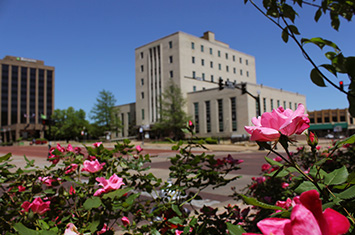Home » Inpatient Rehab Programs » Drug Addiction Treatment » Tyler, TX
Drug Rehab & Substance Abuse Treatment Center Near Tyler, TX
At Renewal Lodge, we’re dedicated to serving Tyler, Texas, and the surrounding areas with our specialized short-term inpatient drug rehab program.
Our approach is tailored to meet the needs of both chronic relapsers and those seeking treatment for the first time. As leaders in in-network insurance coverage, we’re committed to making affordable addiction treatment accessible to Tyler families and their loved ones.

Substance Abuse Trends in Tyler, TX
Tyler, known as the “Rose Capital of America,” faces significant challenges with substance abuse, mirroring trends seen across East Texas and the nation. The city’s drug landscape is diverse and evolving, reflecting both local issues and broader societal shifts.
In recent years, Tyler has seen a troubling increase in opioid abuse, particularly with the rise of fentanyl in the area. Methamphetamine use continues to be a persistent problem, affecting communities across the city and surrounding rural areas. The misuse of prescription drugs and the presence of cocaine also contribute to Tyler’s complex substance abuse picture.
These trends impact individuals from all walks of life – from students at the University of Texas at Tyler to workers in the healthcare and oil industries, from suburban families to rural residents. The effects ripple through our communities, workplaces, and homes, underscoring the critical need for effective treatment options.

"At Renewal Lodge, we integrate mindfulness and emotional intelligence. These are powerful skills our clients never knew they needed."
Peter Piraino, LMSW, LCDC, LISAC, CEO
Understanding the Disease of Addiction
Addiction is a complex disease that doesn’t discriminate – it affects people from all backgrounds in Tyler, from medical professionals to oil field workers, educators to small business owners.
Families should understand the following about addiction:
- Addiction is a chronic disease, not a moral failing
- It often co-occurs with mental health issues
- Genetic, environmental, and personal factors all play a role
- Recovery is possible with the right support and treatment

What Sets Renewal Lodge Apart for Tyler Area Drug Rehab
At Renewal Lodge, we offer an inpatient drug rehab program in a dual-diagnosis setting that integrates the 12 Steps with Mindfulness. This unique approach creates a groundbreaking modality for treatment that addresses both the addiction and any co-occurring mental health issues.
What Makes Our Program Unique:
- Residential treatment programs are offered for 30, 60 or 90 days
- Our facility is co-ed but utilizes gender-specific process groups six days a week
- We practice an integrated treatment approach by combining evidenced-based mindfulness skills and 12 step modalities.
- Our programs include recovery-based lectures, process groups, meditation, and individual treatment plans
We believe that this comprehensive approach gives our Tyler area clients the best chance at lasting recovery. By addressing both the addiction and any underlying mental health issues, we’re able to provide a more holistic and effective treatment experience.


Why We Use Mindfulness in Our Tyler Drug Rehab Program
Mindfulness is at the core of our treatment approach. It’s an ancient practice of being aware of your thoughts, attitudes, beliefs, and emotions. In the context of addiction recovery, mindfulness helps our Tyler area clients become more aware of their mental states and environments, fostering a deeper connection with their emotions, beliefs, and core values.
The benefits of mindfulness in addiction treatment include:
- Helps to manage cravings
- Reduces stress and anxiety
- Improves emotional regulation
- Greater overall well-being and life satisfaction
For many of our clients from the Tyler area, mindfulness has been a game-changer in their recovery journey. It provides them with practical tools to navigate the challenges of early sobriety and build a foundation for long-term recovery.
Dual Diagnosis and Mental Health Support
In Tyler, as in many communities, we often see addiction co-occurring with other mental health disorders. Our clinical team understands the complexity of dual diagnosis conditions and the importance of addressing both issues simultaneously.
Some of the most common questions we encounter are: Which came first, the mental health condition or the addiction? Which should be treated foremost?
In our experience, persons with a dual diagnosis respond better to treatment methods that address mental health in conjunction with substance use disorders. This form of treatment not only improves recovery outcomes, but also advances physical, emotional, and general functioning throughout the treatment episode and beyond.


Family Involvement in the Recovery Process
Often, our families in the Tyler area are so focused on getting help for their loved one that they begin to neglect their own needs. In most cases, families unknowingly begin to contribute to the problem through codependency and enabling, even though their intentions are born out of love and concern.
Addiction doesn’t just affect the individual; it impacts the entire family system. Our family program is designed to educate and support Tyler families throughout the treatment process. We’ve found that recovery improves when all those affected by addiction accept help and take action to heal.

“Without a doubt one of the best treatment centers in the country. If you want to live and are willing to do so by any means then this is the place.”
Aftercare & Relapse Prevention: Transitioning Back to Tyler Life
Recovery doesn’t end when treatment does. We put significant emphasis on aftercare planning for our Tyler area clients, helping them build a solid foundation for lasting recovery as they transition back to their daily lives.
Aftercare planning may include several elements:
- Ongoing therapy sessions
- Alumni support services & weekly meetings
- Developing a relapse prevention plan
- Finding sober activities and communities in the Tyler area

Embracing Life in Sobriety in Tyler
One of the beautiful aspects of getting sober in Tyler is the opportunity to rediscover the city through fresh eyes. Tyler’s rich culture and vibrant community can be powerful allies in recovery:
- Explore the natural beauty at the Tyler Rose Garden or Tyler State Park
- Enjoy outdoor activities at Lake Tyler or the Caldwell Zoo
Attend sober events and meetups in the city - Discover Tyler’s growing culinary scene, from local favorites to farm-to-table restaurants
Recovery isn’t about giving up your life – it’s about reclaiming it. And Tyler offers countless ways to do just that.
Taking the First Step: Reaching Out for Help
Recognizing that you or a loved one needs help is often the hardest part. Making the decision to reach out to a treatment center like Renewal Lodge can be intimidating, but doing so is the first step to getting the support you need for your family and your loved one.
Whether you’re ready to start treatment or just want to learn more about your options in the Tyler area, we’re here to help. No judgment, no pressure – just compassionate support and expert guidance from a team that truly cares about your recovery.
A Nationally Recognized Name Right Here in Texas
Renewal Lodge is regularly featured on some of the Nation’s most prominent and well-known media outlets.












